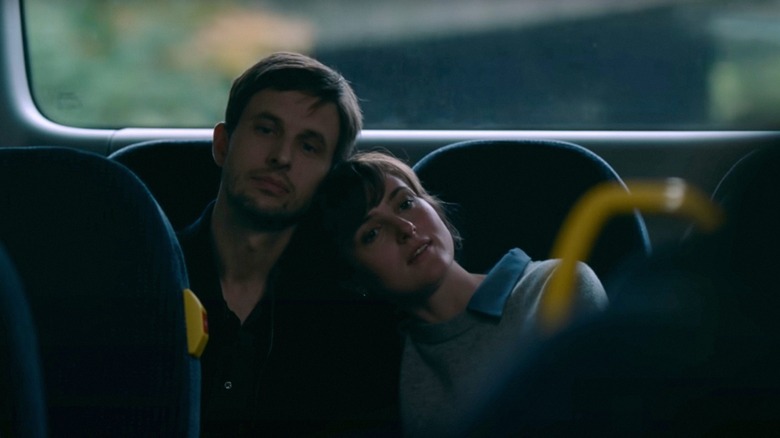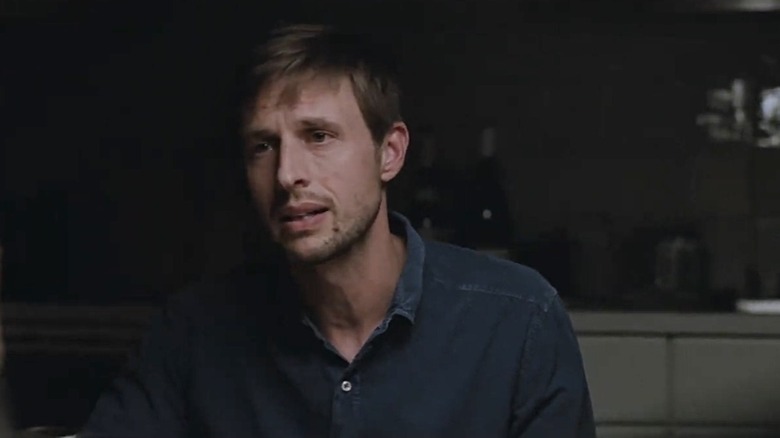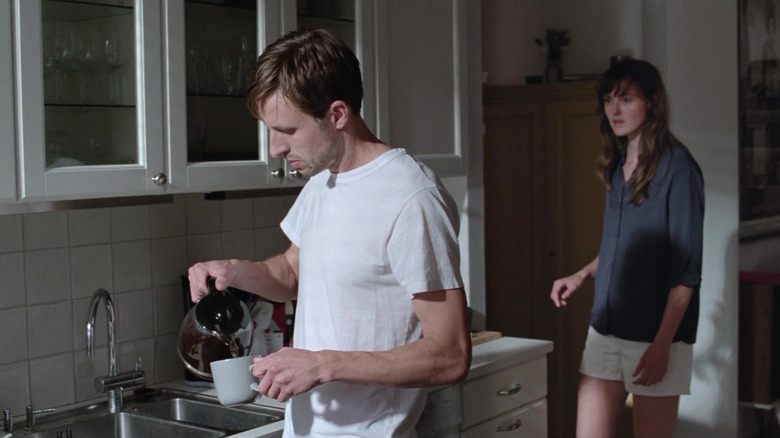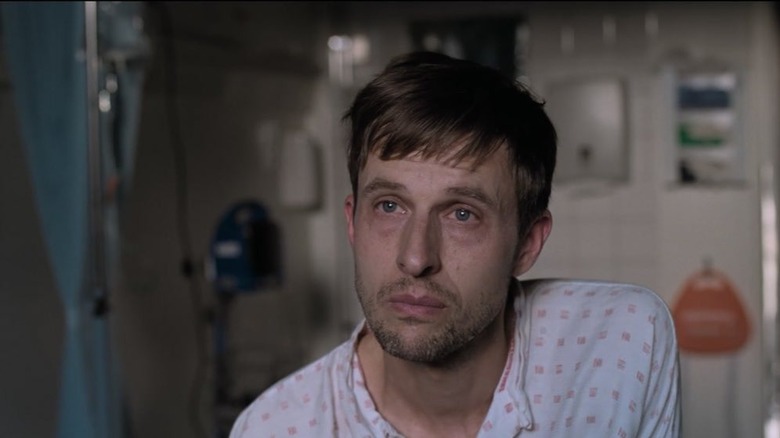The Worst Person In The World Star Anders Danielsen Lie On How To Give A Spontaneous Performance [Interview]
Anders Danielsen Lie stars in, as the site's own Hoai-Tran Bui put it, "the anti-romantic comedy" of the year. "The Worst Person in the World" is told in 14 parts, many of which featuring Julie's (Renate Reinsve) boyfriend and comic book writer, Aksel Willman (Anders Danielsen Lie). The character would probably and comically describe himself as raw and real, like his polarizing transgressive art. He's far from best boyfriend in the world, to put it mildly, but for the actor playing him, not the worst either.
Filmmaker Joachim Trier, as well as his stars, do not paint in broad strokes. "The Worst Person in the World" is one of the many collaborations between Anders Danielsen Lie and Trier. For them, their latest film closes out a trilogy. Recently, Anders Danielsen Lie talked to us about the themes at play in the anti-romantic comedy and two of the film's many unforgettable moments.
"It's both reality and fiction for me."
What themes stood out to you when reading the script? What was your first impression?
To me, it felt like a mix between "Reprise" and "Oslo, August 31st" in a sense that it had the playful narrative structure of "Reprise," but on the other hand, the focused character portrait of "Oslo." I remember I called Joachim and I was extremely happy about the script. I thought it was really nice and funny but deep too. I really enjoyed the concept of making a genre movie, a romantic comedy with more substance, with darker elements. That's something I found very interesting. Also, I think I suggested to Joachim that we should call this a trilogy because the films seem to me thematically related, all of them had "Oslo" as their stage and other similarities between the characters.
How is it shooting in Oslo compared to shooting in other cities you hear horror stories about?
It's much easier to shoot in Oslo. It's funny because I was born and raised in Oslo, and I've kind of grown up in these films. It's both reality and fiction for me, Oslo as a place. But I like the idea of this city, this place as the eternal element in these films where these characters come and go and some of them even die, so that the characters and their stories will eventually disappear, but the place remains, the city will always be there.
Another major theme is the importance of art. At one point, your character questions what all this information about movies, comics, and art really means or says about your life when one faces death. How did you interpret that speech?
Well, that speech means a lot to me, but art and culture is like our collective memory, and that will remain after we're gone. I think on a more personal level of the character, the speech is also realization that all you have left as you grow older is the memories and memories of past experiences. All the things that you have been through in your life is ultimately what remains and that constitutes your identity, who you are. It's almost as if it's impossible to understand yourself if you don't have any memories, any stories about your life. There's a melancholy of the passage of time in the character. In this film, I think it's a recurrent theme in the Oslo trilogy and in Joachim Trier's movies. The monologue or the speech in the script, you never really know when you shoot the movie, what ends up being focused, thematic representation of something.
A monologue is just words, and words can symbolize many things. But I think our method of working together has evolved since we started out, so we were closer to scripted versions of scenes when we started working together 17 years ago. Whereas now we always have respect for the written version, and we try to prepare that as much as possible, but we still try to leave room for something unexpected.
He's said he wanted this movie to be more freeform, and obviously narratively, you see that, but when it comes to the actual work behind making it, it seems still very structured.
It is. And then a very nice example would be the break-up scene, which is a very ambitious script in terms of how you want to orchestrate and then stage all the different elements. But it also had on the script level, it also had some beats where we were allowed to improvise and add content that weren't planned to detail. And hopefully, you will then get the best of both worlds. You will get the composition and the structure of a scripted scene, but you will hopefully also get spontaneity and freshness from semi-improvised stuff.
"I was afraid of rehearsing too much, and that's completely absurd."
What was improvised during the break-up scene?
I don't remember, to be honest. In the script, there were some beats where there was just content, this beat can be about this. Like now, he's telling him so and so, but it wasn't written out. It was a synoptic version of those parts, so we could just be totally free. But we also knew that some of those beats were to be told by the voiceover, because Joachim and Eskil wanted to create the sense that when you are in the break-up scene, which is a very, almost archaic, universal human situation to be in, to break up with somebody and you end up telling each other nasty stuff. And you're saying lines that feels like cliche, so it creates a sense of not being... To almost step out of the situation and look at yourself from the outside. The voiceover could have that kind of function.
So when I say, I don't really remember, it's true because we were just trying to be truthful and honest, and I didn't care so much about what was going to end up in the final cut there. Renata had a very long improvised round where she just, for the first time defines him with words, it's always been the other way around. He has always been articulating her emotions and thoughts. And for the first time she's confronting him, telling him that, "You have always tried to define me with words, and that's our problem. I don't want to be patronized by you doing your regular language treatment," if you see what I mean. I remember that being improvised, and it's a turning point in the scene.
Like you said, you don't think specifically about themes, but it's so natural in the movie. They just organically come out in conversation, letting you reflect about it later instead of in the moment. It's such good writing.
It's very good writing. Sometimes good screenwriting is not a script, it's not a novel. It's not supposed to be published, it's a working tool. And that means that sometimes you rehearse a scene as well as you can, and you try to figure out what is the content, what is the most important thing to convey and to get across to the audience. But sometimes the script is just a tool along the way. So you might end up with something else. You might end up with different words or a different symbol for that content. But my experience is that you always have to be as prepared as you can. If you want to start riffing around and paraphrase stuff, you have to have something that is prepared.
Right. I always like Al Pacino's quote about that, "When you know the script cold, that's when you can deviate."
It's very well put, it's exactly like that. I remember when I started working as an actor, I didn't have any formal training and I didn't have experience and I was afraid of rehearsing too much, and that's completely absurd. Although I understand why I was thinking that way, because you want things to be spontaneous, but it's actually the other way around. If you want to reach a state where you're more open for whatever happens in the present moment with the other actors, the lines have to be second nature, and that has to be a previous stage of development that you're done with. You have to be courageous enough to just throw the script away.
"It's also a comic scene."
What does a preparation look like for you for a film like this?
On this film I didn't do that much research. I did some research on comic books and Robert Crumb and try to figure out some nice references that could define the character, try to be familiar with that. But the most important part of my work was to try to build a chemistry with Renata and try to create the illusion of a long-term relationship together. But that's easy because Renata is a lot of fun to work with. She's a very creative actor, so you know that you will have a lot of possibilities working with her.
So it didn't take too much work to create that illusion?
No. We knew each other from before. We met on "Oslo, August 31st" where she had a small part, but the sequence took a while to shoot, so she spent a lot of time with us on that shoot. We saw her talent and wanted to work with her again, or Joachim wanted to do that. She's just a very generous and creative actor. And when you have colleagues like that, my job gets pretty easy.
What did you take away from researching Crumb and other comic book writers?
There was comic book, "Nemi," in Norway in the early '90s, that was inspired by Robert Crumb in a sense that they looked at comic books as a very uncensored medium, where you could be very honest about all the shameful, taboo parts of human life. Now, this character because he feels slightly misplaced in the current public debate, he's defender of freedom of speech, but he feels threatened in a way, he wants his art to be an uncensored therapeutic situation almost where, where you can just confess everything and there's no such thing as a taboo in that world.
So the radio interview scene, he explains that, but did you think he was actually talented enough to communicate that idea as an artist?
Okay. So that scene means a lot of different things for me, because one function of the scene is to show a character that there's something wrong with. It's like a harbinger of something that's not good. So it was not like we are suggesting that he an illness or something. It's just that now there's something wrong with him and then the rest follows. But I just like the idea that Joachim and Eskil wanted to incorporate a debate, a discussion that is very temporary because to me these films sometimes feel like documentaries to me, because for some reason they always end up documenting where I'm at in my life. Every time we make a film together, it gets more personal than I had expected. It's fun to look back on those films and see traces of what was going on in the public discourse, for example, at the time. I think that discussion is very interesting too, but I don't think we are being opinionated about it.
Presenting it as is?
Yeah. Presenting both sides. Hopefully, we can laugh a little bit at both sides of the debate. It's also a comic scene.
"The Worst Person in the World" is now playing in theaters in limited release.



